David Crane
http://www.the-commodore-zone.com/articlelive/articles/7/1/David-Crane/Page1.html
By TCZ webmaster
Published on 08/28/2006
Activision were one of the greatest software houses in the 80’s during the home computer boom. They developed games for all the major 8-bit computer formats. One of the advantages that they had was employing the game programmer and designer David Crane – an innovative, clever guy, who created some of the best games to grace a home computer. David was behind some of the best selling computer games of all time – including the tremendously successful Pitfall, Ghostbusters and Little Computer People.
Introduction
 Activision were one of the greatest software houses during the 80’s home computer boom. They developed games for all the major 8-bit home computer formats. An advantage they had was employing the game programmer and designer David Crane – an innovative, clever guy, who was responsible for some of the most popular computer games of all time – including the tremendously successful Pitfall series and Ghostbusters. David initially developed games for the Atari 2600 VCS games console - the hardware of this machine was rather restricted and required a lot of effort from the programmer to get the very best out of it. This was probably the primary reason that attracted David to the machine, it provided a challenge that had to be met. |
|
|
However, with the decline of the game consoles due to the popularity of a new wave of home computers, like the Atari 800 XL and Commodore 64, it became obvious that it was time to move on, and David eventually developed games for these home computers and in particular the Commodore 64. Activision became increasingly confident due to David’s success, which led to more exposure in the computer magazines, including some effective marketing of their games. One of their famous and for some controversial adverts, was the so-called ‘Activision Swap’, which appeared in a number of magazines during 1984. This advert portrayed two young kids, with one kid saying ‘I’ll swap four of my tapes for your Activision’, and with the other kid replying ‘No Way!’. The advert was perhaps a little arrogant and patronising, but it was making an interesting point. Activision games were focused heavily on game play, not just the audiovisual experience, which gave their games a clear advantage over the competition. |
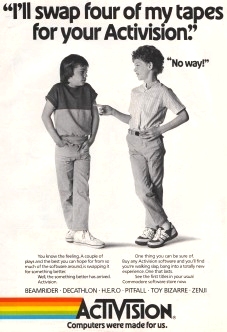 Activision 'Swap' Advert |
Pitfall
|
David's first game with Activision and one of his most successful was
Pitfall. It starred the game character known as “Pitfall Harry”. It was a platform game but not in the traditional sense, as the game screens were more varied than your usual simple platform game. It was really an arcade adventure – your objective to guide Harry through a treacherous cavern system, avoiding hazzards like alligators and scorpions. You will need to be quick, as the game has a time limit! The graphics were simplistic but functional, the sound was mediocre, but the game was certainly very playable. Due to the success of Pitfall - a more impressive sequel soon followed Pitfall II, which was based on the same concept, but the graphics were much improved and the general game design was technically better. A really nice feature was the water that flowed in the cavern system – your character could swim above and below the waterline – it was very effective and really added to the enjoyment of the game. Pitfall II is definitely the better of the two – and one of the best games of its genre. |
 Pitfall II Advert |
|
There was a very interesting controversy related to the Pitfall games, in particular the original Pitfall. A company called Microdeal who at the time specialised in Dragon 32 software – developed a game which also appeared on the Commodore 64 called Cuthbert in the Jungle. The controversy occurred because Activision maintained that the games design, look, and feel was a blatant copy of their Pitfall game. Activision were correct and Microdeal were obviously trying to cash-in on the success of Pitfall, as anybody who plays Pitfall and then Cuthbert will instantly notice the similarities! You can also check this out for yourself by comparing the images below and Pitfall and Cuthbert are also playable online using the Java 64 emulator. |
|
 Pitfall by Activision |
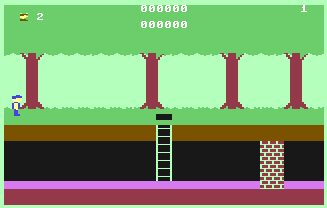 Cuthbert In The Jungle by Microdeal |
There is also another way of looking at this – as the fact a company and programmer had taken the time and effort to effectively produce a clone of Pitfall shows not only how good the original concept was but that imitation is the sincerest form of flattery! Microdeal did not learn anything from this experience though, as years later on the Amiga computer they did their own version of Spy Hunter by Bally Midway called Major Motion… |
|
Decathlon
|
Decathlon was David Crane’s successful venture into a Sport / Olympic
based game. It was a huge selling game in its time and deservedly so. Similar in some ways to Epyx’s Summer Games but also sufficiently different in a number of areas. There were a number of events you could take part in including 100m dash, long jump, high jump, discus, pole vault and javelin. The graphics were great, with smooth animation of the Athletes and the background for the Stadium was reasonably detailed and well drawn. The music and sound effects were neat, nothing stunning, but perfectly functional. |
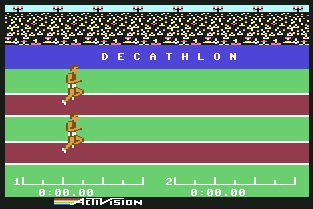 Decathlon by Activision |
 Decathlon Advert |
A notable and infamous feature of sport games of this type at the time including Ocean software’s Daley Thompson’s Decathlon, was the control method used to play the game. Which involved waggling the joystick gradually but building up to a furious pace! The 1500m race for example was torturous and your wrist would be aching by the time you completed the race. There were a lot of joysticks wrecked because of this method – especially the cheaper made joysticks! About the only owners who probably played this game a lot with a joystick that actually survived the ordeal was probably owners of the Wico joysticks – these joysticks had a solid steel shaft so could endure the most reckless use! Some events in the game could become a bit tiresome and repetitive after a while and the control method certainly did not help! But this was one of the better sport based games on the market and cashed in on the Olympic games that was going on at the time. It was very popular and cemented David Crane as a leading games developer and Activision as one of the most prolific and successful software houses. |
Ghostbusters
|
Activision
licensed the rights to develop a game based on the massively successful
Ghostbusters film. David Crane was given the Ghostbusters project and
as the lead programmer he went about designing the game. Unfortunately
a lot of movie related games tended to be hugely disappointing with a
very bad track record. I suppose its fair to say that most critics did
not expect anything special. But everyone was in for a shock as David
worked away producing probably the best film licensed game ever
released on an 8-bit computer. Activision and David also made the
clever decision at the time to use the speech software technology of
Electronic Speech Systems Inc, the same company that did the unique
speech for the game Impossible Mission (see Speech Box for more
information). This was a wonderful idea which added a realism touch to
the game that otherwise would have been missing and the one feature
that Ghostbuster gamers would always remember. |
|
|
The film had a chart topping song by Ray Parker Junior and the game also featured a terrific rendition of this song. Although some people at the time thought the music was done by David, apparently it was actually done by Adam Bellin who also worked for Activision. The introduction to the game was great, first you had the Ghostbuster’s logo appearing then the immortal words Ghostbusters, followed by the unforgettable evil laugh! Then the music kicked in – with a unique and clever touch – a small bouncing ball – moving to the actual words of the song as the music progressed! I remember actually seeing the game for the first time at a friends house - and we commented on what a neat idea it was to have the song lyrics scrolling on screen to the music! |
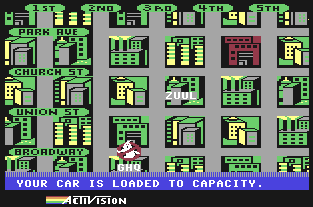 Ghostbusters by Activision |
 Ghostbusters Advert |
As the game was based on the film – all the familiar features you would expect were present – first you entered your name to start up a new Ghostbusters franchise and then you purchased a car to travel around the city. You could then kit out the car with various Ghostbusting items like the ghost bait and vacumn! Then it was off Ghostbusting – a small map of New York city appeared on screen, and just like the film the city experienced increased PK energy created from the numerous Ghost hot spots occurring all over the city. An area on screen would glow red - then you would drive your car to that destination. Although the car part of the game was the weakest as you were not really driving – although if you happened to come across a yellow ghost zipping around the screen – you could use your vacumn to suck up the ghost! Once you arrived at your destination you would position your men, lay the trap bait and launch your streams – but don’t cross them! If you were unsuccessful in trapping a ghost then the ghost would slime you and the speech “he slimed me” would cry out from your character! Although the game was criticised for being a bit limited even repetitive and I suppose you could argue this. The fact is David Crane created a very faithful adaptation of the original film and one of the better computer games of the time. Due to the success of David’s game and the callaboration between Activision and the film company Paramount. If you happened to be one of the many gamers who wrote to Activision about how good you thought the game was – you would be sent memorabilia of the film, this could be a book, ti-shirt or something else. You would at the very least of received a thank you letter from Activision. Very few companies actually did anything like this – certainly not on this scale – its something that other companies especially British ones even today could learn from. The consumer is king never forget it! |
Little Computer People
|
One
of the advantages of the Commodore 64 over some of the other home computer
formats e.g. the Spectrum was that it had a disk drive capability. A
number of games were released on disk format for the 64 and some made
use of the disk space available to create bigger and better games. |
|
|
The game Little Computer People, designed by David Crane and based on a concept by Rich Gold, took full advantage of the Commodore 64’s disk format - accessing the disk for new information as and when required. This is just not practical with a tape based game because access can be so slow – even with turbo load routines. Little Computer People was a revolutionary idea – all about a little computer person that lived in your machine! The game was designed with the central idea that you would care for your LCP like you would your own pet! You would load up your Little Computer People Research Project disk every day and enter the date and time of the day’s session. When you used your LCP disk for the first time – you would also need to enter your name, so your LCP would know who his owner was. Then after a minute or so the LCP house would appear on screen and after a further few minutes your LCP would ring the front door and then enter. This was amusing to say the least as your LCP would check each room in the house and decide whether he wanted to move in! – the house would appear the same on every disk sold after all he lives in the same house inside every Commodore 64 computer! Your LCP also came with his own pet dog – which would follow him around the house and needed to be fed at certain times. |
 Little Computer People - Letter Of Introduction |
|
The LCP game was designed with over 250 names and 5 distinct characters - one of these names would be randomly assigned to each LCP disk sold. So although some people believe that each LCP on every disk sold had a different name, this is not actually correct. The name could be the same, however due to the simple but clever way that the look and personality of each LCP was randomly assigned – the chances are that even if a LCP name on a disk was the same as another, the colour of the LCP’s clothes, personality and character could be different. So your LCP may be called “Harry” and come with a baseball cap and white clothes and another may be called “Harry” but with brown hair and blue clothes! An interesting quirk due to an oversight when the LCP name list was complied is that 4 LCP names, Patrick, Peter, Joseph, and Justin, are duplicated in the name list! – this probably led to more LCP disks sold with the name Patrick, Peter, Joseph, and Justin than other names! During each LCP session your objective was to observe your LCP and care for him. You would communicate with your LCP by typing in words at the top of the screen. There were about 160 different words that could be used – although some words appear to be inactive – in that they don’t actually appear to do anything! (for a full list, please see the Little Computer People Page). |
|
 Little Computer People Activision Catalogue |
You would know how he was feeling due to his facial expression which could be happy, moody or sad! and he would use his typewriter to type letters about what he was thinking and feeling – so that you would know how to keep him happy! If he was kept happy by your caring, which would mean keeping him well fed with plenty of water and food, patting him on the head while he sits in the lounge room chair (a hand would appear from the stairs!) and he would grin!, an occasional telephone call or delivery of presents like a book or record would also be very welcome. He would then dance to a record, talk to you via the telephone using some bizzare language, play the piano or computer games or even ask to play card games, like poker. This could become a bit repetitive after a while but it was great fun. |
If you left your LCP without attention for a prolonged period of time – like leaving your computer on overnight – he would become a manic depressive and actually turn a sickly green! But you wouldn’t do that would you… There were also some cute moments – like when he would ask to play poker he would knock on your television screen and you would hear a suitable sound effect that really sounded as if he was knocking the screen! and when he would wash his hands before eating, you would even hear the running water! As the session with your LCP progressed he would do other things like use the bathroom, take a shower or even go to sleep. He would occasionally read a newspaper and if he was a bit cold then he would go outside and chop some wood and then place the logs in the living room grate to start a fire! |
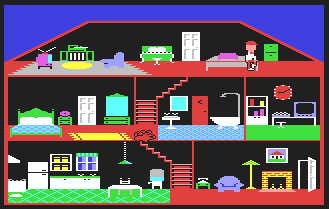 Little Computer People by Activision |
The best feature though was when your LCP played the piano. The music for LCP was by Russell Lieblich (the same guy who did Master of the Lamps) and was just amazing! Your LCP would jiggle about with the notes to the music as he was playing away. The sound interface device (SID) of the Commodore 64 was extraordinarily powerful and the piano music that your LCP played was outstanding. You really would think it was a real piano playing – its that good! Another notable feature is the quality of the sound effects which are quite frankly amazing. When your LCP walks in and out of rooms you hear his footsteps and the footsteps will sound different depending on what surface he is walking on! The noise of a tap running, phone ringing or letter being typed is also realistic. |
|
Little Computer People - Other formats
| LCP was released on other home computer formats, including the Apple II and Amiga. Interestingly both these conversions were inferior to the Commodore 64 version. Why? Because although in the Amiga’s case the graphics were improved. The sound effects and music that made the Commodore version so appealing were in comparison appalling. The only nice touch that the Apple version had which the Commodore did not was the day display e.g. Mon (for Monday) that would appear under the picture in the lounge room. It doesn’t actually add anything important to the game, so it is not really missed. | |
|
I do wonder why the day display did not appear in the Commodore version because you always entered in the date and time before the game loaded as it was used for when your LCP typed a letter so it could be dated, and the wall clock in the house would show the correct time – so why this was omitted on the Commodore 64 is strange. I suspect it was probably due to a memory constraint. Also, because you can only type in the last 2 digits of the year the game is not y2k compatible in that if you type in 05 for 2005 then the date in the game would appear as 1905! This is unfortunate, but remember that the game was released in 1985 so nobody would have considered that the game might still be used 20 years later! |
 Apple II (day display) |
Unfortunately the game did not sale that well. I know this for a fact because I enquired whether there would be an upgraded / enhanced version of LCP developed and I received a letter from Activision which explained due to insufficient sales etc. that it was highly unlikely that any add-ons for LCP would be developed. This is especially disappointing considering the excellent reviews the game received from magazines like Zzap!64. |
|
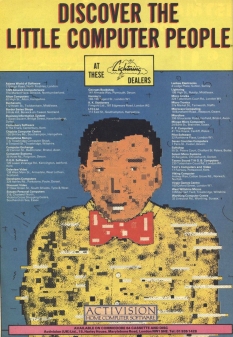 Little Computer People Advert |
LCP was way ahead of its time and the games market was probably not ready for this revolutionary concept. To compensate for this and to try and improve sales, Activision decided to release a tape version of the game for the Commodore 64 and other home computer formats like the Spectrum. The tape based versions of LCP should never have been made. The tape version is appalling, as it is basically a cut-down version of the game. Due to the advantages of disk space and the ability to access a disk for more information speedily at any time – the tape version can’t have any of this – so it was more limited / restricted. Avoid at all costs! Also, it has to be said that the marketing of LCP was poor – the adverts and cover packaging for the game were not very appealing and no doubt this also had a negative impact on sales. Activision not continuing development of LCP in my opinion was a huge mistake – if you consider how this game could of evolved even back then – it may well of ended up now as something like The Sims series of games by Electronic Arts (even Sam Nelson Producer at Activision has stated that there was an LCP idea floating around at the time which involved an apartment complex of LCP's!). |
Little Computer People - Urban myths
|
There are a few urban myths about LCP – for example some people
maintain your LCP could get a girlfriend! This is not true! Your LCP
could throw a party (based on letters he would type about having one!)
not true. Every LCP disk sold had a different name – not true. Typing
in a command like “play a different song” is better than typing in play
piano – not true, the word “different” is not understood so it makes no
difference (pun not intended!) in using it! Your LCP had a unique
personality – this is sort of true, there is a random personality that
is assigned to a LCP by the program – but the same personality could
appear on another LCP disk but with a different LCP. Your LCP could
take a shower and then change clothes – this is true, but you may need
to play a game session for quite a while to see this happen! A number of games have been released long after LCP like The Sims and even the Tamagotchi craze which owe a lot to this truly original and inspirational concept by Rich Gold and David Crane. Not that Rich or David will ever get any recognition for this – but make no mistake LCP inspired a whole host of copy cat games and David was the original innovator of implementing this idea. |
 Tamagotchi by Aki Maita (Bandai) |
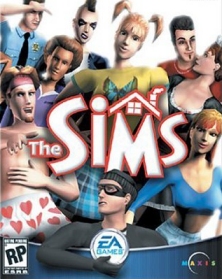 The Sims by Electronic Arts |
The computer world isn’t fair sometimes and this was certainly the case with LCP. But at the end of the day it was up to Activision to see the true potential of LCP as a product and they missed a huge opportunity. Yes, it was an idea before its time and was probably just too different for the market at the time – but it should of been continually developed so it had a chance to really prove itself and then computer owners would of recognised the genius of the concept. There is no doubt that David Crane was an influential and creative designer who made a huge impact on the computer scene during the 80’s. Games like Pitfall, Ghostbusters and LCP have stood the test of time in terms of their implementation and playability. David’s Ghostbusters was 'realised'on the Commodore 64 in a way that stunned a lot of people at the time. Its not surprising that an enhanced Pitfall was also released on the PC at a later date and the concept of LCP has been advanced to the extreme with games like The Sims by Electronic Arts. |
|
David’s software legacy is there for all to see. Activision deserve credit for their part in advancing the course of computer games and it should also be remembered that Activision were responsible for the pioneering software Alter Ego a truly amazing text based life simulation that was stunning in its day and received rave reviews in computer magazines including ZZap 64!. As a special tribute to David Crane and the Little Computer People – Commodore Zone has developed a dedicated Little Computer People Page on this website and there is a category for LCP in the discussion forum. All the information you ever wanted to know about LCP (some of which is mentioned in this article) is available. Including a unique and exclusive feature only available at Commodore Zone – an LCP disk library! Which will allow you to download an LCP 'Research Project' disk for every LCP name ever released! So if you have lost your LCP due to a lost or damaged disk – the chances are you will find a suitable replacement here! |
 Alter Ego by Activision |
Game Release Timeline
|
|
|
|
|
Pitfall |
Pitfall II |
Little Computer People |
|
|
Decathlon |
|
|
|
Ghostbusters |
|
|
Legends of the C64 - David Crane category: David Crane - The Pet Person Interview by Julian Rignall, which appeared in Zzap!64 Profile: David Crane by Bohdan Buciak, which appeared in Commodore User Another Day... Another Subroutine... by Tony Tyler, which appeared in Big K I ain't 'fraid of no ghosts! by Christina Erskine, which appeared in Commodore Horizons. These articles contain some photos of David Crane. The online Java 64 emulator will allow you to play Pitfall, Pitfall II and Cuthbert In The Jungle. If you would like to comment on this article then please use the comment/rating feature available. This article differs from the original article published on the old Commodore Zone website. It has been rewritten in parts and also corrects a factual error regarding the date feature of the Commodore 64 (c64) version of the Little Computer People game. Thank you to the following websites which were used for sourcing some images that appear in this article: Amazon.com, Wikipedia, Moby Games, Stadium 64. |
